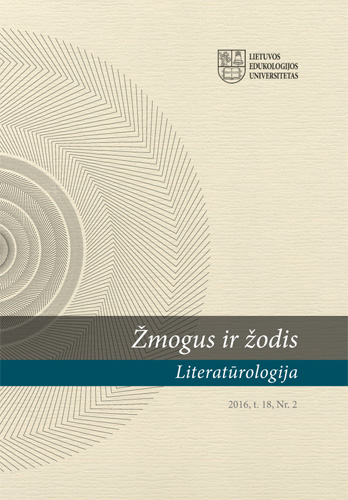Tyla ir nušvitimas Jono Juškaičio poezijoje
Silence and enlightenment in Jonas Juškaitis’s poetry
Author(s): Virginija Balsevičiūtė-ŠlekienėSubject(s): Aesthetics, Phonetics / Phonology, Semantics, Lithuanian Literature
Published by: Vytauto Didžiojo Universitetas
Keywords: Jonas Juškaitis; poetic landscape; aesthetics of silence; ethnics of authenticity;
Summary/Abstract: This article discusses the aesthetics of silence in the poetry by Jonas Juškaitis. Its analysis extends and complements research of Juškaitis’s poetic world and highlights existential meanings in poet’s texts. The article analyzes the relationship between the sounds and silence, semantics of light and enlightenment and its ways of expression. Metaphorical concept of enlightenment, interpreted as the existential experience, is often linked to experiencing silence. The article also reveals various oppositions and meanings of sounds and silence, light and darkness. The analysis shows that metaphors of silence, light, and enlightenment, so frequent in Juškaitis’s poetry, support artistic life in many poems. They open deep Juškaitis’s poetic worldview stratum, inscribe themselves in the concept of its existence and are related to subject’s ethic solutions. Juškaitis’s poetic world is phonic. Here, the sound emerges as a contrast to noise. Meaningful spaces of silence are commonly found in nature. Lyrical „I“ chooses silence, aiming to establish a dialogue with nature, the world of the dead or transcendence. Recurring associations of silence as calmness and depth open to the subject his own existence and enables him to understand oneself and the world. Juškaitis’s poetry is full of light, which appears in a variety of contexts, ranging from colorful background of a landscape to complex metaphors, which assume existential meaning. In many poems, the darkness appears as almost a necessary opposition to light. Desirable and possible subject’s meeting with God emerges through the images of silence and light. Juškaitis’s works are based on the ethnics of authenticity. The aesthetics of silence helps to reveal it. God in his poetry is the moral basis for the existence, the strength that ensures world’s harmony. Constant oppositions between noise and silence and light and darkness testify to the sensory nature of Juškaitis’s poetry. These semantic oppositions, frequent in lyric structure, help to highlight poet’s contrasting worldview.
Journal: Žmogus ir žodis
- Issue Year: 18/2016
- Issue No: 2
- Page Range: 81-91
- Page Count: 11
- Language: Lithuanian

